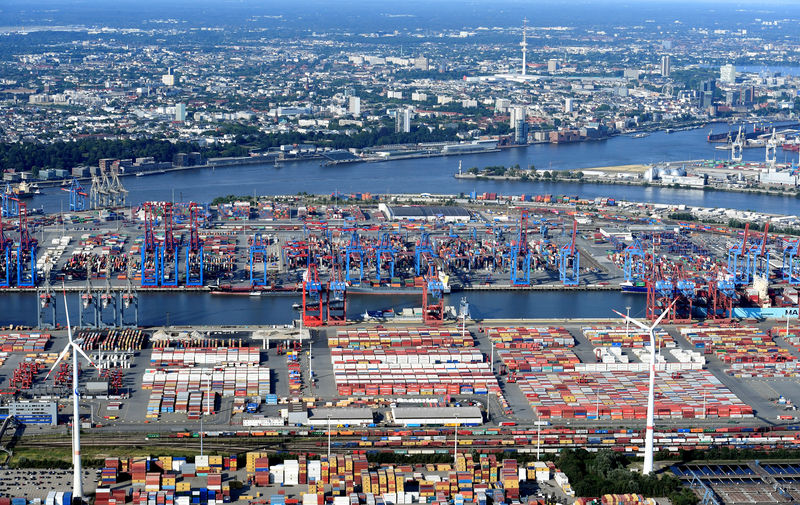BERLIN (Reuters) - German exports rebounded more strongly than expected in May but failed to fully recover from a slump a month earlier, data showed on Monday, as trade conflicts cool Europe's largest economy in the second quarter.
Exports grew by 1.1% on the month in May, data from the Federal Statistics Office showed on Monday, surpassing the 0.5% rise forecast in a Reuters poll. In April, shipments abroad fell by 3.4%.
Imports fell 0.5% on the month in May. The upshot was a rise in the trade balance to 18.7 billion euros ($20.99 billion) from 16.9 billion in the prior month.
Other recent data have painted a gloomy picture of German industry, with engineering orders falling and activity in the manufacturing sector contracting.
Separate Statistics Office data showed industrial output increased by 0.3% on the month in May, undershooting the forecast for a 0.4% rise. A month earlier, output fell 2.0%.
Andrew Kenningham, economist at Capital Economics, said May's rise in industrial production did not signal the end of the problems for Germany's manufacturers.
"On the contrary, it now looks almost certain that industrial production declined in the second quarter overall, contributing to a sharp slowdown in German GDP (gross domestic product) growth, if not an outright contraction," Kenningham added.
Figures released on Friday showed German industrial orders fell by 2.2%, far more than expected, in May.
Now its 10th year of expansion, the German economy returned to growth between January and March, posting a 0.4% expansion, but the Bundesbank expects a small contraction in the second quarter.
"As other economic indicators have also disappointed, the prospect of a decline in economic performance is increasing," said Alexander Krueger at Bankhaus Lampe. "Growth forecasts are likely to be further reduced."
In a sign that an economic slowdown is beginning to bite, a survey by the Ifo institute published on Thursday showed German manufacturers expect to make more use of "Kurzarbeit" -- a short-hours facility aimed at avoiding mass lay-offs.
Trade conflicts, Britain's expected departure from the EU and a cooling global economic outlook are causing headaches for Germany, which for many years relied on exports for growth but has come to depend increasingly on private consumption.

(Reporting and writing by Paul Carrel; Additional reporting by Riham Alkoussaa; Editing by Michelle Martin)